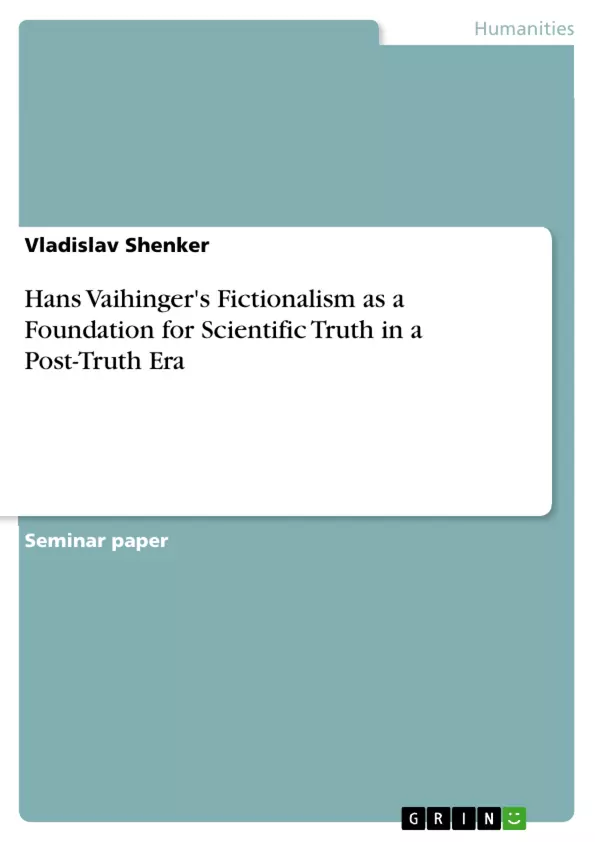We need a strong meaning of truth in order to guide our actions as individuals and as a society. While lots of people tell us that we have to stop burning fossil fuels today in order to mitigate the effects of global warming, others tell us that global warming is nonsense. So how should we act, and who should we listen to, if we know that nobody can tell what the "real" truth is? It almost seems like truth is something that we desperately need but can not have.
I begin my search for answers by looking at two of the most fundamental theories of truth: the Correspondence Theory of Truth and the Coherence Theory of Truth. Those two can be considered "basic" or classical answers to the question of truth, while several others, like Tarski‘s Theory of Truth, Realism and Antirealism, Deflationism, and others either try to cope with the problems that arise in the context of those classical conceptions or state completely new ones.
Since I am ultimately interested in the notion of scientific truth, the second chapter is dedicated to the discussion of two modern theoretical approaches to the problem of truth, Steve Fuller's critical "Post-Truth" approach and the positive "Veritist" approach represented by Baker and Oreskes, that aim to explain how scientific truth differs from everyday truth and how scientists establish consensus among each other.
3As both approaches substantially differ in their interpretation of the problem, I discuss Hans Vaihinger's Fictionalist Theory of Truth in an effort to "sublate" ("aufheben" in Hegels words) both approaches in a synthesis afterwards.
Finally, I use the newly gained knowledge and apply it to the example of man- made global warming. My proposal is that it could be beneficial, if we would stop trying to establish global warming as a scientific fact and start seeing it as a socially constructed fiction, that can positively guide our actions.
Inhaltsverzeichnis (Table of Contents)
- Let's talk about Truth
- Classical Theories of Truth
- Correspondence Theory of Truth
- Weaknesses of the Correspondence Theory of Truth
- Coherence Theory of Truth
- The Establishment of Scientific Truth
- Fullers "Post-Truth" Approach
- Scientific Truth and Power
- Scientific Truth as a Social Construct
- The Veritist Approach to Truth
- Scientific Truth from a Pragmatic Point of View
- Fullers "Post-Truth" Approach
- Hans Vaihinger: Philosophy of "As-If"
- The Pragmatic Notion of Truth
- Vaihingers Fictionalism
- The Act of Thinking
- Fictions as Fruitful Lies
- Fictions as Maps
- The Fiction of Global Warming
- Recap
- Example: Let's pretend as Climate Change would be real
- The Real Truth about Man-Made Climate Change
Zielsetzung und Themenschwerpunkte (Objectives and Key Themes)
This paper aims to explore the concept of truth, particularly in relation to scientific knowledge in a post-truth era, by examining the limitations of classical theories of truth and exploring alternative approaches. It seeks to understand how scientific truths are established and the role of social constructs and power dynamics in shaping our understanding of reality.
- The nature of truth in a post-truth era.
- The limitations of traditional theories of truth, such as the Correspondence Theory of Truth and the Coherence Theory of Truth.
- The role of social constructs and power dynamics in the establishment of scientific truth.
- The application of Hans Vaihinger's fictionalist theory of truth to understand scientific knowledge.
- The potential benefits of viewing global warming as a socially constructed fiction.
Zusammenfassung der Kapitel (Chapter Summaries)
The paper begins by introducing the concept of truth in the context of the current post-truth era, highlighting the challenges posed by the increasing prevalence of skepticism and conflicting narratives, especially regarding scientific issues like climate change. It then examines two prominent classical theories of truth, the Correspondence Theory and the Coherence Theory, highlighting their limitations in providing adequate frameworks for understanding scientific truth. The paper then delves into the establishment of scientific truth, exploring two contrasting approaches: Steve Fuller's critical "Post-Truth" approach, which emphasizes the role of power and social constructs in shaping scientific knowledge, and the more positive "Veritist" approach by Baker and Oreskes, which focuses on the processes by which scientific consensus is established.
To bridge the gap between these two opposing views, the paper explores Hans Vaihinger's Fictionalist Theory of Truth, examining how fictions can be used as fruitful tools for guiding our actions and understanding the world. It concludes by applying this fictionalist approach to the example of man-made global warming, suggesting that viewing it as a socially constructed fiction could be more beneficial than attempting to establish it as a definitive scientific fact.
Schlüsselwörter (Keywords)
Truth, Post-Truth, Scientific Truth, Correspondence Theory of Truth, Coherence Theory of Truth, Fictionalism, Hans Vaihinger, Steve Fuller, Baker & Oreskes, Global Warming, Climate Change, Social Construction.
Frequently Asked Questions: Hans Vaihinger and Truth
What is Vaihinger's Fictionalist Theory of Truth?
It is the "Philosophy of As-If," which suggests that many of our thoughts and scientific models are fictions—useful "lies" that help us navigate the world even if they don't represent objective reality.
What is the "Post-Truth" approach by Steve Fuller?
Fuller argues that scientific truth is often a social construct tied to power dynamics, rather than a neutral representation of the world.
How can global warming be seen as a "fruitful fiction"?
The author proposes that treating climate change as a socially constructed fiction might be more effective for guiding positive societal action than debated over "real" truth.
What are the classical theories of truth discussed?
The paper examines the Correspondence Theory (truth as matching reality) and the Coherence Theory (truth as internal consistency).
Why is the concept of truth problematic in science today?
In a post-truth era, scientific consensus is often challenged by conflicting narratives, making it difficult for society to decide on collective actions.
- Quote paper
- Vladislav Shenker (Author), 2020, Hans Vaihinger's Fictionalism as a Foundation for Scientific Truth in a Post-Truth Era, Munich, GRIN Verlag, https://www.grin.com/document/1153869



